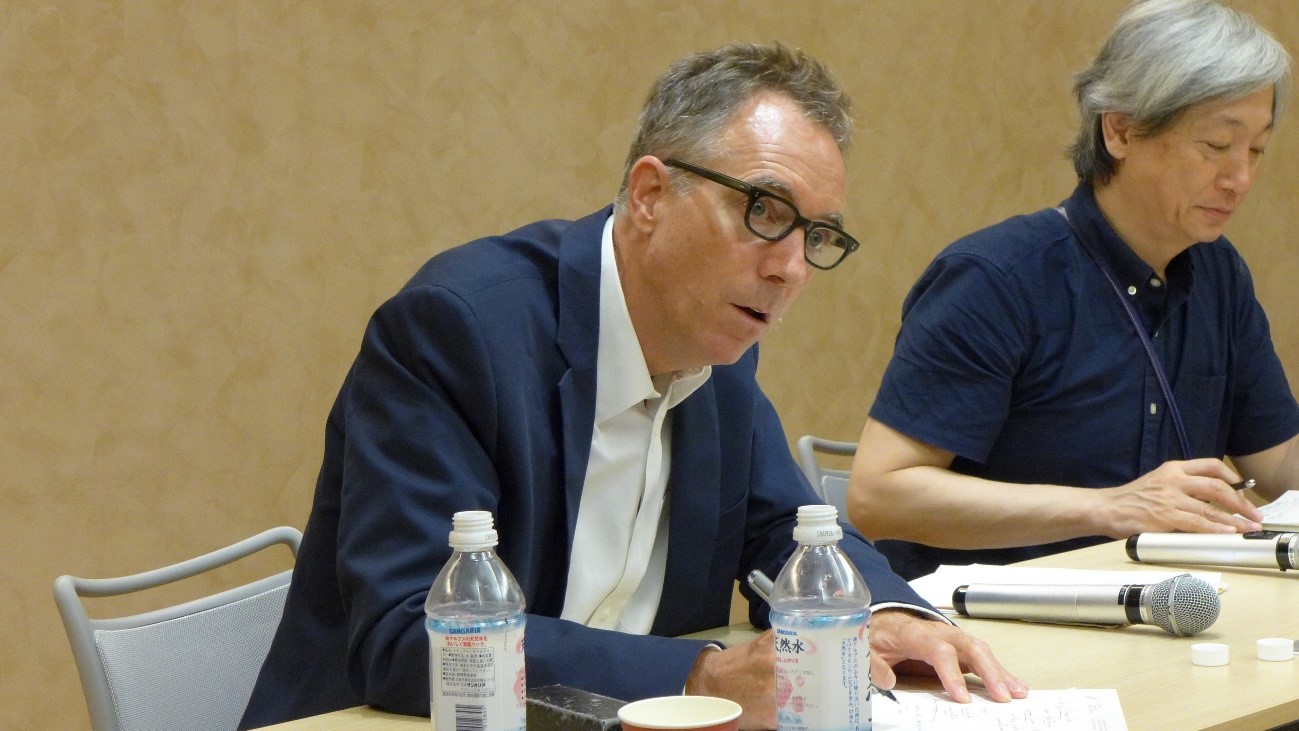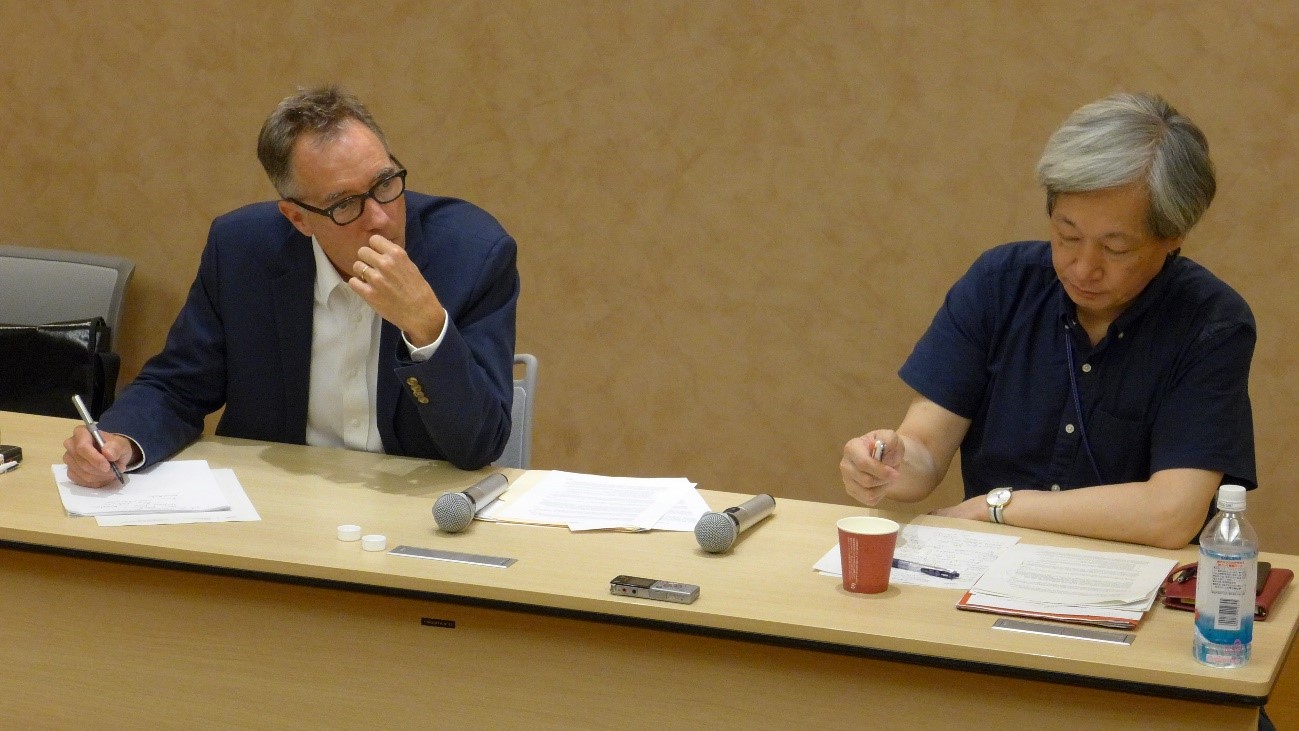SSU Forum with Associate Professor Andrew Norris
| Date: | Thursday, September 28 2017, 16:30-18:00 |
|---|---|
| Venue: | Conference Room, 3rd Floor, Ito International Research Center |
| Subject: | "Being Realistic About Neoliberalism" |
| Lecture: | Andrew Norris, Associate Professor, University of California, Santa Barbara |
| Language: | English |
| Hosted by: | Security Studies Unit, Policy Alternatives Research Institute, the University of Tokyo |
The SSU was delighted to host a talk delivered by Andrew Norris, Associate Professor at the Department of Political Science, University of California, Santa Barbara. Professor Norris is the author of numerous publications, including the recent book Becoming Who We Are: Politics and Practical Philosophy in the Work of Stanley Cavell (Oxford University Press, 2017).
The speaker was briefly introduced by SSU Director Professor Kiichi Fujiwara.
Professor Norris thanked Professor Fujiwara for the opportunity to speak at the University of Tokyo and proceeded to provide some background to the topic of his talk, namely the development of a critique of neo-liberalism from the perspective of Raymond Geuss’s realist approach to politics.

Neo-liberalism still appears as the predominant way to think about political-economic arrangements in the Western world and beyond. This conception of the economy and of the society can be seen as a reaction against the rise of socialism in its various forms, which seemed uncontainable in the interwar period. The key neo-liberal thinkers, Friedrich von Hayek, Ludwig von Mises, Karl Popper, and Milton Friedman, were then chiefly preoccupied with the recovery of nineteenth century classical liberalism’s core message, being however at the same time all too aware that that message had to be modified and adapted to the quite different realities of the twentieth century.
Since its inception in the late 1930s, neo-liberalism has advocated a mode of political economic organisation which limits the role of the government to that of “protector of the markets”, while theorising that market mechanisms generate the most efficient resource allocation, and therefore that market-based mechanisms should be introduced everywhere is possible in order to maximise economic efficiency, economic growth and thus prosperity.
Since the 1970s, with the rise of political figures like the British Prime Minister Margaret Thatcher and US President Ronald Reagan, neo-liberal doctrines have become mainstream, enjoying a global expansion after the collapse of the Soviet bloc in the 1990s. Even some centre-left politicians, most notably British PM Tony Blair, embraced neo-liberalism as the way forward.
The result of decades of privatisation, marketization and other neo-liberal policies are far from what was promised. In the US and globally, inequality has risen to unprecedented levels in many decades, and phenomena of extended social malaise, for instance the explosion of the homeless population, signals the failure of neo-liberalism.

Professor Norris articulated the core of his talk as a critique of neo-realist positions, particularly with regard to the concept of desire and preference, based on a perfectionist moral and political theory, which is to be contrasted to the positivistic accounts underpinning neo-liberal ideas. Such accounts conceptualise the onset of preferences in the mind of the individual as something out of the scope of philosophical inquiry. Individuals are, according to this view, free to prefer whatever they wish, while the community or government should have no say in the formation of such preferences. Within the neo-liberal horizon, a distinction between “preferences” and “needs” becomes practically impossible.
A realist critique of this position sees instead the individual’s preferences and politics at large as historically situated, and develops into an ethical-political perfectionist argument. It is the task of the community, particularly of the humanities, to teach to its members would should be regarded as valuable, re-establishing the possibility to distinguish again between preferences and needs. While this certainly runs counter to the neo-liberal abhorrence of what they characterise and dismiss as “cognitive paternalism”, Professor Norris argued instead that the humanities should recover their original pedagogical project in the formation of individuals capable of developing and exploring a mediated, reflective relationship with the self and consequently with one’s desires and preferences. This should be the starting point for the reconstruction of a new political economy.
The realist position as advanced by Geuss is pessimistic not only in relation to the diagnosis of the present and future trajectory, but also on the prospects of the radical change which he advocates. In this respect he appears to be heavily influenced by Adorno’s negative dialectic. Professor Norris stated that the work of US philosopher Stanley Cavell may offer a more promising alternative, while fitting the general orientation and purpose of Geuss’s critique. As Geuss laments the absence of a moral authority which may speak for and represent the community as a whole, as the Catholic Church may have had in medieval Europe (a gap which has been misleadingly filled by the positivism of neo-liberal thought), Cavell actively recovers the idea of authority. According to him, authority is the one exercised by each member of the community over oneself in terms of the choice to undergo the transformation which leads away from one’s old self towards a better way of being. This ensures that the radical critique we need is immanent. It proceeds as the experience of our own conformity. Being influenced by Emerson, Cavell does not think that critique is attained as a break with conformity, but rather with its transformation.
Finally Professor Norris recognised the difficulties of such a transition, whose prospects are bleak, but also highlighted the necessity of a utopian dimension, a dimension which is not alien even to neo-realism itself.

